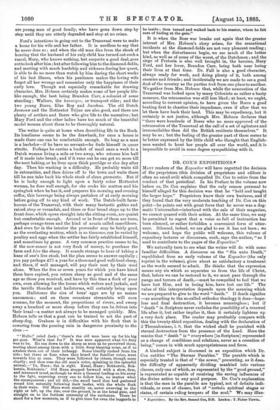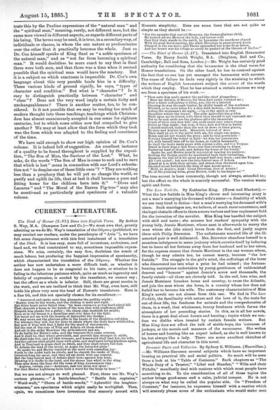DR. COX'S EXPOSITIONS.*
Maivv readers of the Expositor will have regretted the decision of the proprietors (this division of proprietors and editors is often no small evil) which compelled Dr. Cox to retire from the conduct of that periodical. In his Preface to the volume now before us, Dr. Cox explains that the only reason personal to alleged for this decision was that he "held and taught the larger hope." Proprietors know their own business, and if they found that the very moderate teaching of Dr. Cox on this point—he points out with great force that he never was a dog- matic Universalist—interfered with the sale of their magazine, we cannot quarrel with their action. At the same time, we may be permitted to regret that a voice so fall of instruction has been silenced, or rather forbidden a convenient form of utter- ance. Silenced, indeed, we are glad to see it has not been ; we welcome, and hope the public will welcome, this volume of expository lectures or discourses, such, says the author, "as I used to contribute to the pages of the Expositor."
We naturally turn to see what the writer will do with some familiar difficulties. A discourse on the " Sin unto Death," republished from an early volume of the Expositor (the only reprint in the volume), gives about as satisfactory a treatment as the words seemed to admit. He thinks that the expression means any sin which so separates us from the life of Christ, that, before we can be restored to it, we must pass through the pangs and terrors of death,—must be compelled to feel that we have lost Him, and in losing him, have lost our life." The value of this interpretation depends upon the meaning which we are prepared to give to the word " death." If death signifies —as according to the so-called orthodox theology it does—hope- less and final destruction, it becomes meaningless ; but if " death " in Scripture never excludes the possibility of a renewed life after it, but rather implies it, then it certainly lightens up a very dark place. The reader may profitably compare with
this the twenty-third exposition, dealing with the declaration of 2 Thessalonians;i. 9, that the wicked shall be punished with eternal destruction from the presence of the Lord. Here the maxim that " death " is " everywhere [in Scripture] represented as a change of conditions and relations, never as a cessation of being," comes in with much appropriateness and force.
A kindred subject is discussed in an exposition which Dr. Cox entitles " The Sterner Parables." The parable which is especially treated is that of " the sower," presenting, as it does,. the difficulty of apparently dividing mankind into various' classes, only one of which, as represented by the "good ground," is represented as capable of receiving the saving influences of the divine action to any good purpose. Dr. Cox's explanation; is that the men in the parable are typical, not of definite indi- viduals, or even of classes, but of " certain spiritual stages or states, of certain ruling tempers of the soul." We may inns-
* Expositions. By the Bev. Samuel Cox, D.D. London : T. Fisher Unwin. trate this by the Pauline expressions of the "natural man" and the " spiritual man," meaning, surely, not different men, but the same man viewed in different aspects, as regards different parts of his being. The terms may be used, it is true, in a secondary way, of individuals or classes, in whom the one nature so predominates over the other that it practically becomes the whole. Just so Dr. Cox himself speaks of King Saul as "a noble specimen of the natural man," and as "not far from becoming a spiritual man." It would doubtless be more exact to say that in Saul there were both men, and that there was a time when it seemed possible that the spiritual man would have the mastery. Bat it is a subject on which exactness is impossible. Dr. Cox's own language about this very parable lands him in a difficulty. These various kinds of ground signify, he says, " types of character and condition." But what is " character" Is it easy to distinguish practically. between " character " and " class " ? Does not the very word imply a certain fixity and smchangeableness ? There is another matter, too, to be con- sidered. Is it not possible that we may be reading too much of modern thought into these teachings, teachings which Christen- dom has almost unanimously accepted in one sense for eighteen centuries, but to which some critics now feel compelled to give another P We may at least allow that the form which they took was the form which was adapted to the feeling and conscience of the time.
We have said enough to show our high opinion of Dr. Cox's volume. It is indeed full of suggestion. An excellent instance of a quality to be found throughout is supplied by the exposi- tion, " The Son of Man, the Saviour of the Lost." What, he asks, do the words " The Son of Man is come to seek and to save that which is lost" mean in connection with our Lord's exhorta- tion not " to despise one of these little ones "? " They are nothing leas than a prophecy that he will yet so change the world, so purify and uplift its life, that at last it shall become a pure and fitting home for the children born into it." " Dives and Lazarus " and " The Moral of the Barren Fig-tree " may also be mentioned as particularly good specimens of a valuable volume.



































 Previous page
Previous page